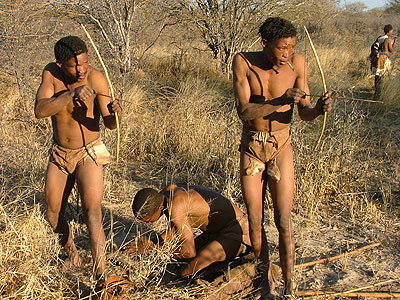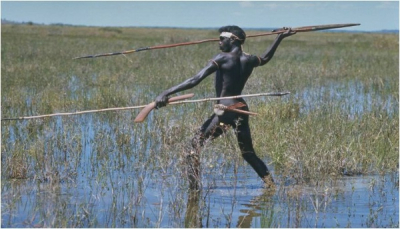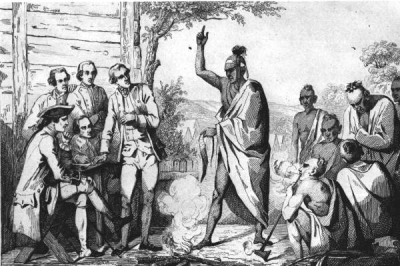
Health of farmers and hunter-gatherers
 Despite the
innovations that sprang out of agricultural societies, Jared Diamond and Richard
Manning both argue that the first farmers were actually less healthy
than their ancestors. We can look at this question from a lot of
different angles, by comparing the skeletons of the first farmers with
the skeletons of contemporaneous hunter-gatherers or by looking at
modern hunter-gatherers. In both cases, average height is a basic
indication of nutrition, and hunter-gatherers come out literally on top
nearly every time. Did you know that only in the last century in
the richest parts of the world have the statures of agriculturalists
regained the heights of ancient hunter-gatherers?
Despite the
innovations that sprang out of agricultural societies, Jared Diamond and Richard
Manning both argue that the first farmers were actually less healthy
than their ancestors. We can look at this question from a lot of
different angles, by comparing the skeletons of the first farmers with
the skeletons of contemporaneous hunter-gatherers or by looking at
modern hunter-gatherers. In both cases, average height is a basic
indication of nutrition, and hunter-gatherers come out literally on top
nearly every time. Did you know that only in the last century in
the richest parts of the world have the statures of agriculturalists
regained the heights of ancient hunter-gatherers?
Other indications of ill
health abounded among the first farmers. Tooth decay became  prominent along with high
infant mortality, iron deficiencies, and an increase in disease.
Farmers also had a significantly shorter life span than contemporaneous
hunter-gatherers.
prominent along with high
infant mortality, iron deficiencies, and an increase in disease.
Farmers also had a significantly shorter life span than contemporaneous
hunter-gatherers.
The bad health of early
farmers was partly due to human populations expanding
faster than the farmers' ability to grow food for themselves, as well
as to famines when crop failures or fires destroyed
hoarded grain. But information from early agricultural societies
in the Americas show that it also took us a while to figure out how to
nourish our bodies adequately while eating huge amounts of just a few
foods rather than bits and pieces of this and that --- for example, we
had to learn to nixtamalize corn to unlock niacin and to combine that
corn in the right proportions with beans to create a well-rounded
diet. Mineral deficiencies were also more likely in a farming
society since nearly every soil is deficient in one more more micronutrient, a deficiency that farmed
crops pass on to their farmers.
Even in the seventeenth
century, the lifespan of an average European
was around 40 years, while transplants to Massachusetts (where
colonists by necessity had a partly hunter-gatherer diet) lived to the
average age of 71.8 years. Part of the increased life span  of
the colonists can be attributed to the lower population in North
America at the time, which carried with it a lower risk of parasities
and disease, but nutrition was a key factor as well. (As a side
note
--- yes, the Native Americans were taller than the first European
settlers.)
of
the colonists can be attributed to the lower population in North
America at the time, which carried with it a lower risk of parasities
and disease, but nutrition was a key factor as well. (As a side
note
--- yes, the Native Americans were taller than the first European
settlers.)
But we're better off
now, right? Actually, Jared Diamond notes in Guns,
Germs, and Steel that
even in the modern world, only those of us fed by agribusinesses are
really better off than our hunter-gatherer neighbors. Most modern
peasant farmers and herders spend more hours working than those in
hunter-gatherer societies and live less healthy lives. True, our
lifespans are now longer due to advances in modern medicine, but I have
to wonder if we would have needed those medical advances if we hadn't
weakened our bodies by changing over to a grain-based diet.
This post is part of our History of Agriculture lunchtime series.
Read all of the entries:
|
Want more in-depth information? Browse through our books.
Or explore more posts by date or by subject.
About us: Anna Hess and Mark Hamilton spent over a decade living self-sufficiently in the mountains of Virginia before moving north to start over from scratch in the foothills of Ohio. They've experimented with permaculture, no-till gardening, trailersteading, home-based microbusinesses and much more, writing about their adventures in both blogs and books.
Want to be notified when new comments are posted on this page? Click on the RSS button after you add a comment to subscribe to the comment feed, or simply check the box beside "email replies to me" while writing your comment.

Interesting thoughts. I remember reading that the !Kung people of Africa (hunter/gatherers... but mainly gatherers) only spend about 3 hours a day in seeking and preparing food. The rest of their time is spent socializing and their lifestyle is somewhat sedentary, especially compared to what we might imagine.
I've spoken with people who seem to think that all humans except for the modern, post-industrial human, have miserable lives filled with endless toil. I don't doubt that this narrow impression comes from the tough experience of Europe as an agrarian society.
I'm not an archeologist, so I can't say anything definitive --- take this with a grain of salt. However, the more I delve into the primary literature, the more it seems to be accepted that (at least in North America, which is what I've mostly been reading about), life spans decreased substantially and people got much less healthy when agriculture came on the scene. Although, to be honest, it's more specifically when corn arrived --- our region had the eastern agricultural complex previously, and that didn't seem to decrease our health in the same way.
Your point about the dangers of hunting make sense, but you have to understand that in recent prehistory, we'd already killed off most of the big game (or climate change had done that for us --- people argue that point). "Hunting" often meant snaring rabbits or digging mussels out of the river, tasks that are no more dangerous than pulling up briars in your garden.
Your life expectancy figures for hunter-gatherers don't actually match the literature I've read. But I haven't delved as deeply into this part, so I hesitate to say more there.
I need your assistance. I am creating a film of my lecture, "No More War: the Human Potential for Peace" and a promotional video for the film and a Keynote lecture on the same topic. To illustrate one point concerning male use of aggression and hunting, I want to use the photo of Bushmen hunting that I found online at this site: http://www.waldeneffect.org/blog/Health_of_farmers_and_hunter-gatherers/. The intended purpose is educational, but I may decide to charge a small fee for downloads or ask for a small honorarium in order to recover the costs of production. I am a retired academic and am paying for this project out of my own pocket, so I would greatly appreciate being able to use the drawing for free. My work, and project, can be found at www.AFutureWithoutWar.org. I need to know if you hold a copyright to the picture, or if you know whether anyone does.
Thank you for your consideration.
Judith Hand
Judith --- That is a great photo, but unfortunately it's not mine. You can find the source for any of the photos on this page (or on the site) by clicking on them. Hopefully the real copyright holders can help you out. Good luck with your project!
Maire --- As a followup on my previous comment, I just read an interesting article that might clear some things up for you. Dawn of agriculture took toll on heath tells about a review of all the relevant literature showing that the advent of agriculture led to smaller, less healthy people across the world.
I like to read posts like this. Its trivial but it makes you wonder.
"I have to wonder if we would have needed those medical advances if we hadn't weakened our bodies by changing over to a grain-based diet"
I've read a couple of diet books(primarily vegetarian books.) I can recommend The Food Revolution by John Robbins. All of the sources i have read do link just about all of the diseases and illnesses we have picked up to the food we eat and the lifestyles we live. And it makes sense. As one moves farther away from one's natural course, then there must be side effects to that decision. So as we've moved to chemical agriculture, air conditioning with carcinogens in it, and carbon riddled air in the cities....of course there will be health problems. So i would agree that earlier man was a healthier human being(in certain parts of the year). Take for example: There is a tribe( I can't remember the name) somewhere in the tropics that had never worn shoes in their entire history. Scientists wanted to conduct a study so they went down there and somehow got select members to wear shoes for a period of time. During this period of time these people developed disorders/diseases of the feet in a very short period of time. They later got a podiatrist to examine the tribes feet and concluded that this tribe had some of the strongest feet ever recorded. Maybe people would have less back problems if they didn't wear shoes.
yep, shoes are an odd one, not only that but the human body is capable of discharging something like 10000 volts, amperage may be low, but still, that is A LOT of built up energy, we were designed to be grounded.
Second, this book http://gutenberg.net.au/ebooks02/0200251h.html#ch20 this huge study done on indigenous people who have converted to a western diet, and the ill effects. Diet before and during pregnancy, special diets, as in special plants for health. Mmm hmm, there is a plant out there that for any illness.
Maybe that's why I always feel so good after I've fun around barefoot. It also reminds me of this study that if you turn down the heat, you live longer.
It also reminds me of this study that if you turn down the heat, you live longer.
I hadn't read that particular book, but have read a similar study about what happened to a group of Australian Aborigones who were Westernized.